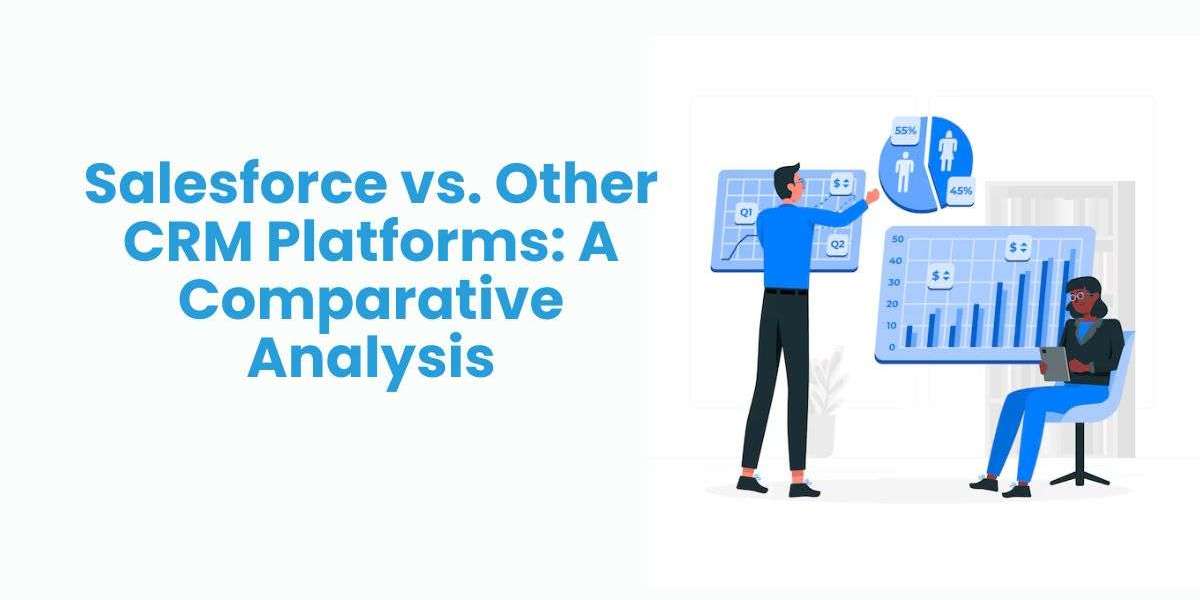Customer Relationship Management (CRM) platforms have become essential for businesses looking to streamline operations, improve customer interactions, and enhance sales performance. Among the many CRM solutions available, Salesforce stands out as one of the most widely used and robust platforms. However, businesses often compare Salesforce with other CRM platforms like HubSpot, Microsoft Dynamics 365, Zoho CRM, and Pipedrive before making a decision. Understanding the differences between these platforms is crucial for selecting the right CRM for your organization. This comparative analysis will help businesses determine whether Salesforce implementation services offer the best value for their needs.
Key Factors to Compare CRM Platforms
To make an informed decision, businesses should evaluate CRM platforms based on the following factors:
- Features and Functionality
- Customization and Scalability
- Ease of Use
- Integration Capabilities
- Pricing and Cost-effectiveness
- Support and Community
Salesforce vs. Other CRM Platforms
1. Features and Functionality
Salesforce is renowned for its comprehensive feature set, which includes advanced sales automation, marketing automation, AI-powered analytics, and extensive reporting tools. In comparison:
- HubSpot CRM: Offers a user-friendly interface with strong marketing automation but lacks deep customization for sales teams.
- Microsoft Dynamics 365: Strong integration with Microsoft products but has a steeper learning curve.
- Zoho CRM: Affordable with essential CRM functions, but lacks enterprise-level capabilities.
- Pipedrive: Best suited for small businesses with a focus on pipeline management but lacks marketing automation.
Salesforce remains the most feature-rich and scalable option, making it suitable for businesses of all sizes.
2. Customization and Scalability
Salesforce is known for its high level of customization, allowing businesses to tailor the CRM to their specific processes. It offers:
- Custom workflows and automation.
- Industry-specific solutions.
- Scalable architecture for growing businesses.
Compared to other CRMs:
- HubSpot: Limited customization; best for startups and small businesses.
- Microsoft Dynamics 365: Customizable but complex to configure.
- Zoho CRM: Moderate customization but lacks advanced automation.
- Pipedrive: Minimal customization; ideal for basic CRM needs.
Salesforce excels in customization and scalability, making it a preferred choice for enterprises.
3. Ease of Use
While Salesforce offers a powerful platform, it has a steeper learning curve compared to more intuitive solutions like HubSpot and Pipedrive. However, Salesforce provides extensive training resources and user communities to help businesses adapt.
- HubSpot: Most user-friendly interface with drag-and-drop functionality.
- Microsoft Dynamics 365: Requires technical expertise; best for companies already using Microsoft tools.
- Zoho CRM: Simple interface but lacks depth in advanced features.
- Pipedrive: Intuitive and easy to set up for small businesses.
For businesses seeking ease of use with minimal setup, HubSpot and Pipedrive are better options, whereas Salesforce provides a learning curve but unmatched long-term benefits.
4. Integration Capabilities
Salesforce provides one of the most extensive integration ecosystems through its AppExchange marketplace. Businesses can connect Salesforce with various third-party applications such as:
- Marketing automation tools (Marketo, Pardot, HubSpot).
- ERP systems (SAP, Oracle, Microsoft Dynamics).
- Customer support tools (Zendesk, ServiceNow).
Comparatively:
- HubSpot: Integrates well with marketing tools but has fewer options for enterprise software.
- Microsoft Dynamics 365: Best integration with Microsoft ecosystem.
- Zoho CRM: Integrates with Zoho’s suite but limited third-party integrations.
- Pipedrive: Basic integrations; best for sales pipeline management.
Salesforce stands out with its flexibility in integrations, ensuring seamless connectivity with various business applications.
5. Pricing and Cost-effectiveness
Pricing plays a major role in CRM selection, and Salesforce is often considered a premium option. Its pricing tiers cater to small businesses, mid-market, and enterprises, but it can be costly when adding additional features.
Comparison:
- HubSpot: Offers a free plan but becomes expensive as features are added.
- Microsoft Dynamics 365: Expensive, especially for businesses not fully invested in Microsoft products.
- Zoho CRM: Affordable for small businesses but lacks enterprise-grade features.
- Pipedrive: Budget-friendly but limited in advanced capabilities.
Businesses looking for affordability may opt for Zoho CRM or HubSpot’s free version, whereas enterprises requiring advanced features may find Salesforce worth the investment.
6. Support and Community
Salesforce has a vast support network, including:
- 24/7 customer support (for enterprise users).
- Extensive knowledge base and training via Trailhead.
- A large global user community.
Comparatively:
- HubSpot: Free users get limited support; paid plans offer better assistance.
- Microsoft Dynamics 365: Enterprise-level support but complex ticketing process.
- Zoho CRM: Standard support; better for small businesses.
- Pipedrive: Limited customer service options.
For businesses that need dedicated support, Salesforce offers the most comprehensive resources.
Conclusion
When comparing Salesforce with other CRM platforms, it becomes evident that while alternative solutions like HubSpot, Microsoft Dynamics 365, Zoho CRM, and Pipedrive have their strengths, Salesforce stands out for its extensive feature set, scalability, integration capabilities, and customization options. Though it requires an initial investment and training, Salesforce provides long-term value for businesses looking to scale their CRM operations.
For companies seeking expert guidance in implementing Salesforce effectively, partnering with a Salesforce implementation consultant ensures seamless integration, customization, and optimized CRM performance. Investing in the right CRM solution today can significantly impact business success in the future.



